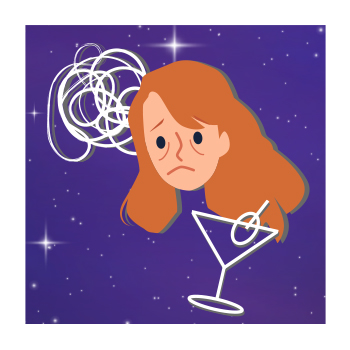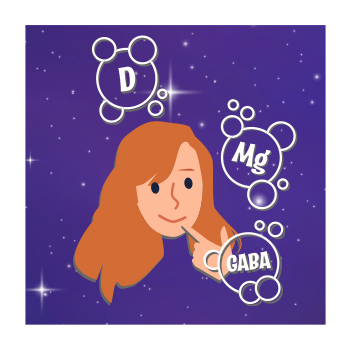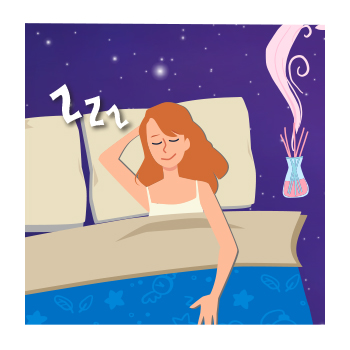


Sign-up for {N}power to get exclusive discounts, newsletters, members-only features, and more!

For some people, slipping into bed at night can be the best part of a long day, but for anyone who struggles with chronic sleep issues, it can be, well, a nightmare. Sleep is something that can’t be forced—as anyone who has ever found themselves wide awake in the middle of the night knows—but there are things you can do to support your body’s natural circadian rhythm and a normal sleep cycle, finding that sound sleep you crave.

Before we dive into the solutions, let’s recap what a normal sleep cycle looks like. Sleep occurs in two major phases—non-rapid eye movement (NREM) and REM sleep. NREM is divided into stages 1-3, from falling asleep to light sleep to “slow-wave sleep,” or deep sleep, followed by REM (“dream”) sleep. Over the course of night, we cycle through these phases multiple times, from NREM to REM sleep, with deep sleep predominating in the early part of the night and bouts of REM sleep getting longer in the latter part of the night. REM sleep is when our brains process and store relevant events of the day, while deep sleep is when tissues are repaired and built, immunity is strengthened, and metabolic waste, like protein plaques associated with Alzheimer’s disease, is cleared from our brains.

It’s no secret that anyone living in the modern world deals with stress, and chronic stress can be a major sleep thief. Sleep is a natural shift from the sympathetic (“fight or flight”) to the parasympathetic (“rest and digest”) nervous system, and if all goes well, levels of the stress hormones cortisol, norepinephrine, and epinephrine drop, while levels of melatonin, the hormone that regulates the sleep-wake cycle, increase. But if you are turned on fight or flight all the time (i.e., always stressed out), with chronically elevated cortisol levels, sleep is going to be challenging, if not impossible. If stress is derailing the sleep train, focus on reducing stress levels first. Exercise, yoga, breathing exercises, daily walks, regular sauna use, and meditation can help reduce stress and support sleep. Adaptogens like tulsi (“holy basil”), rhodiola, and reishi mushroom help support the body during times of stress, helping to encourage healthy sleep as well.1 2 3
While your diet may not be the first thing that comes to mind when contemplating a good night’s sleep, what you eat can have a profound effect on how well, or poorly, you sleep. There are obvious dietary tips, like avoiding caffeine in the latter part of the day, but did you know that a diet full of refined carbs and sugars can seriously jeopardize a healthy sleep cycle? This type of diet leads to blood sugar instability, inflammation, insulin resistance, and cortisol dysregulation, all of which can lead to poor sleep quality. A diet rich in vegetables, healthy fats, and quality protein supports healthy blood sugar balance, inflammation levels, and adrenal health. Finally, while a nightly glass of wine or a nightcap may seem like a good idea to wind down for sleep, it’s the last thing you should do. Alcohol interacts with several neurotransmitters important for regulating sleep, disrupting the normal sleep cycle, leading to poor-quality sleep.4 If you must have a nightcap, try this tart cherry and magnesium mocktail!
Along with getting your stress levels in check and sticking to a healthy diet, you can find additional support in a variety of nutrients. Most of the nutrients covered here support a healthy sleep cycle in the long term—give it time to build optimal levels in your body.
One of the main effects of magnesium deficiency is sleep disturbance, including less deep sleep, a decrease in total sleep time, and increased waking during the night. Magnesium plays an important role in regulating the body’s stress response system and supports the normal production of GABA, a neurotransmitter integral to healthy sleep. Magnesium supplementation has been shown to increase deep sleep—the stage of sleep when our brains rest and recover, critical for cognitive function—and reduce nighttime cortisol levels in older adults.5 6

Magnesium threonate (commonly called “Magtein”) may be especially helpful, particularly for promoting deep sleep. A 2024 placebo-controlled study including 80 healthy adults aged 35-55 with self-reported sleep problems found that 1 gram/day of magnesium threonate taken for three weeks improved sleep and mood. The individuals taking the supplement saw significant improvements in sleep quality, including more time in deep sleep, improved mood (“reduced grouchiness and anger”), energy, alertness, and daytime activity and productivity. The magnesium threonate—500 mg of Magtein taken twice daily—started to have an effect within two weeks. Magnesium threonate is unique from other types of magnesium because it can cross the blood-brain barrier, effectively increasing magnesium levels in the brain.7
The RDA for magnesium ranges from 310 to 420 mg daily for adults 18 and older, but some functional medicine doctors recommend doses from 500 to 1,200 mg daily for optimal results.8 9
Low levels of vitamin D have been associated with poor sleep quality and quantity, with research indicating that levels less than 20 ng/mL can significantly increase the risk of “unhealthy sleep.” Vitamin D is known to influence the activity of hundreds of genes, and now researchers have discovered that it appears to activate two genes which control our circadian rhythm. The circadian rhythm affects body temperature and hormone production (including melatonin) and is heavily influenced by sunlight. Our bodies also naturally produce vitamin D upon exposure to sunlight, leading the researchers to suggest that vitamin D may play an important role in the “maintenance of circadian rhythms at the cellular level.”10
Experts recommend maintaining blood levels of vitamin D at 50 ng/mL to support optimal health.11
This amino acid found in green tea has a calming, relaxing, and anxiety-reducing effect.12 It helps support healthy sleep via several changes in the brain including increasing levels of the calming neurotransmitter GABA, which is intimately involved in sleep, while decreasing levels of excitatory neurotransmitters. It also increases alpha brain waves, present during REM sleep.13 L-theanine has been shown to cross the blood-brain barrier, within about 30 minutes of taking it, and increases alpha brain waves. GABA is also available as a supplement, and a 2019 study found that a combination of L-theanine and GABA was more effective compared to either supplement taken alone. Using an animal model, the researchers discovered that taken together, L-theanine and GABA decreased sleep latency, the time it takes to fall asleep, and prolonged sleep duration, including increasing both REM and NREM sleep, deeper sleep during which the body restores and repairs.14
For sleep support and reducing stress, try 100-400 mg of L-theanine15 and 100-200 mg of GABA.16
This amino acid also acts as an inhibitory neurotransmitter, and when there are disruptions in these types of neurotransmitters it can lead to mood and sleep disorders.17 Research shows that taking glycine before bed may improve sleep quality, in part by supporting the body’s natural circadian rhythms. It also promotes a slight drop in body temperature, a physical change associated with falling and staying asleep.
A low dose of 3 grams/daily before bedtime was found to improve sleep quality and reduce daytime sleepiness and fatigue in people with “insomniac tendencies or restricted sleep time.”18

If you struggle with sleep, you’ve likely heard tips like, “no screen time before bed,” or “sleep in a dark, cool room.” This is sleep hygiene—the environment and habits you create to build a healthy sleep experience. Things like no screen time at least one hour before bed and sleeping in a dark, cool room are basics (avoiding screen time before bed is particularly important because the blue light from the screens suppresses melatonin production). Other healthy sleep hygiene habits include keeping a consistent bedtime and waking time; avoiding large meals and alcohol in the evening; cutting back on caffeine and avoiding it in the afternoon and evening; adopting relaxing activities, such as reading, gentle yoga or stretching, or a bath just before bed; keeping a consistent bedtime routine; and creating a calming bedroom environment (white noise machines and aromatherapy diffusers are great!). Good sleep hygiene looks a little different for everyone. Find what works for you—something that you will stick to—to create your own healthy bedtime routine.
A foundation of good health is built on a healthy diet, regular movement, and quality sleep. If one of these components is missing, overall health will suffer. Natural sleep aids are abundant, but sometimes the best tactic is to build a foundation for healthy sleep from the ground up by reducing stress, eating well, and supplementing with a few basic nutrients that are known to support your body’s natural sleep cycle. Because you deserve a good night’s sleep.



Sign-up for {N}power to get exclusive discounts, newsletters, members-only features, and more!